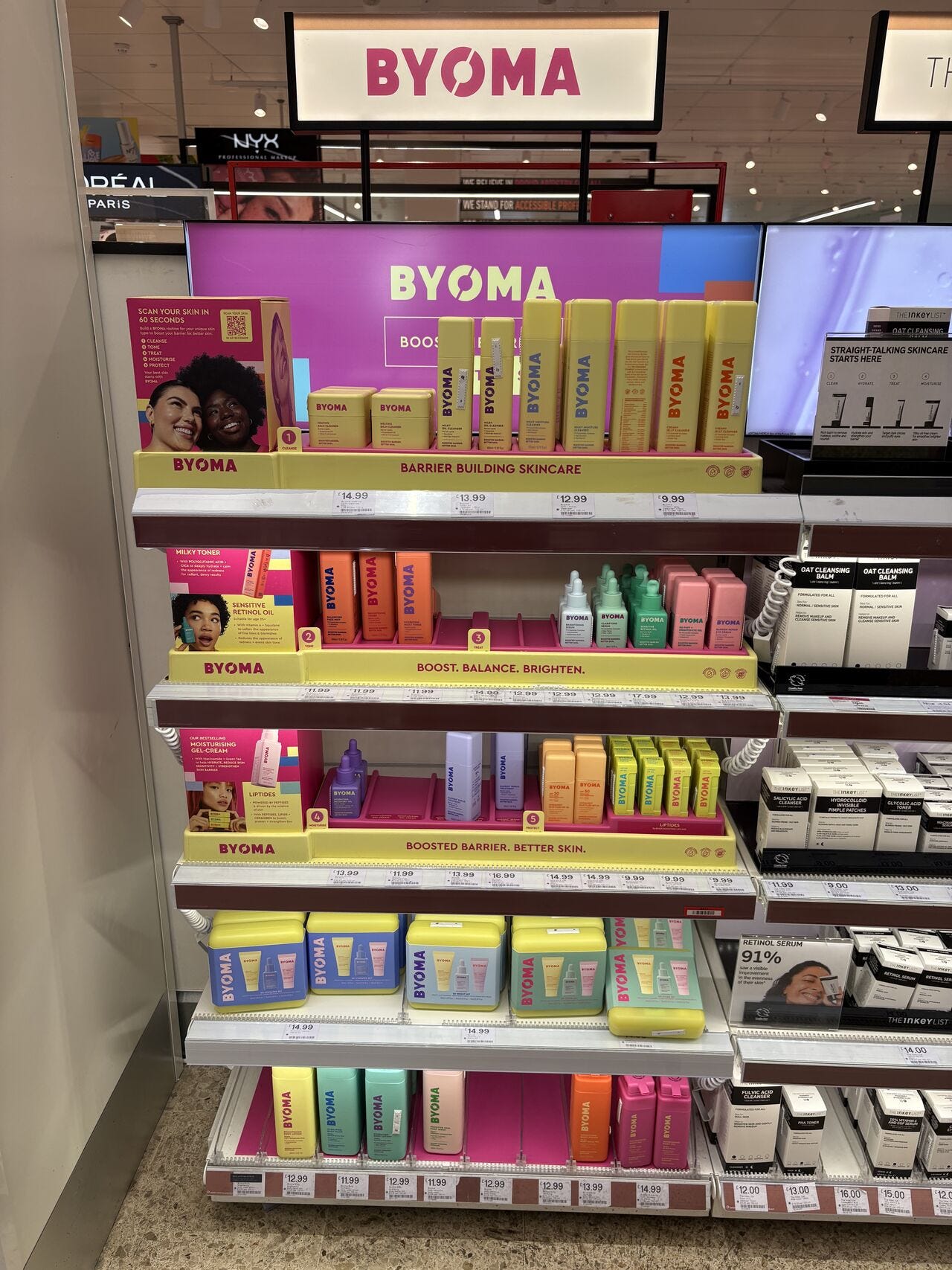The store as verification in a digitally saturated world
A spot in Sephora isn’t just a marketing and sales boost. It now says to the customer that you’re legitimate.
On a recent project I did a deep dive into the biggest trends among emerging and maturing skincare brands.
And what became clear, entirely unsurprisingly, is how saturated the market is.
That’s because the barriers for entry are being removed, and launching a business has never been easier.
TikTok Shop is the best example of this. In 2024 more than $33 billion was spent in TikTok Shop, and somewhere between 70% and 80% of all brands are within the beauty sector.
It’s a veritable beauty pile-on.
A quick search for “skincare” delivers a frantic feed of videos from experienced sellers and influencers to total newbies, some sharing tips, some sharing their favourite brands and others promoting their own.
And whether you’re initiated in this world or not, it’s hard not to feel overwhelmed.
Fascinatingly, conversations I then had with retailers revealed that physical stores have taken on a new role in this frantic environment - and one that is likely to grow in importance.
A reassuring mix of vetted products
Many of these digitally native skincare brands are fantastic at building a following online through brilliantly authentic storytelling.
Examples are abundant.
Byoma, a colourful brand that’s known for its focus on protecting the “skin barrier”, is everywhere on TikTok with devoted followers praising its quality and scientific provenance.
Bubble Skincare has amassed 80,000 "ambassadors" who are sent samples of new products before they launch. The business only launches products that are approved by 90% of the ambassadors, which at once boosts the authenticity of the brand and is an enormous boon for marketing, as the ambassadors naturally share everything within this process.
Skin+Me meanwhile, a deeply scientific skincare brand, offer ultra-personalised products based on skin consultations both online and offline.
These brands and others have been hugely successful in making their mark and becoming serious players in the skincare world remarkably quickly.
But when it comes to scaling, the next step is always stores, and this isn’t just to scale sales.
Conversations I had with buyers at major beauty retailers revealed that because demand for being stocked is so high, shelf space in stores has taken on an elevated power and meaning.
A spot in Sephora isn’t just a marketing and sales boost. It now says to the customer that you’re legitimate.
The hollow digital environment
The ease of building a beauty business online today is actually both a blessing and a curse.
It’s led to an environment that is not only saturated, but where even the newest, smallest brand appears remarkably slick and professional.
And to put it frankly, when looking good is that simple, reassuring the customer about the long-term viability of your product needs more than snappy TikTok videos and a decent website.
Furthermore, major retailers are now overwhelmed by applications from new beauty brands to be stocked in stores.
That means landing in a physical store really means something.
One of my contacts described it as verification. She said that it’s become too difficult for customers to assess legitimacy of brands online, and customers are savvy enough to know that getting stocked in a major retailer is hard.
The mere presence of a brand, she suggested, gives an immediate boost, wherever the customer chooses to buy the product.
Because ultimately, in a world where hundreds of similar looking new brands are thrust upon you online, it all feels a little hollow.
A product you can touch, feel and discuss in a physical store is, naturally, the perfect antidote.
Another answer to a digital challenge
As I bang on about relentlessly, physical retail isn’t just relevant because 75-80% of all sales typically happen there.
It is also relevant because stores constantly solve problems created by the rapid emergence and evolution of digital retail.
Digital saturation and digital fatigue is one such problem. It’s bad for customers, but it’s also bad for brands. Fighting for love and attention in an environment that’s already packed to the gills is a price worth paying to get started, but it isn’t a long-term strategy.
Stores are the ideal next step not just to sell but to legitimise and to reassure those fans you’ve built online.
Or to put it differently, online is a great place to get that first sale, but the physical store is where you’ll start building longevity.
Skincare is the perfect example of this. Skincare is a ritual, and product quality is everything. Many retail industries are a mix of style and substance - but in skincare, substance is style.
Whether it’s clinics, DTC stores or retail placements, you’ll find very few skincare brands becoming serious businesses without a clear physical strategy and investment.
The Ordinary are a great example. They are digitally nimble, and have a committed following. But they committed to physical retail through their own spaces and retail placements from the beginning. And that’s ensured they’ve remained relevant for nearly 10 years, despite other brands and trends coming or going.
They and others know that in a world where new brands appear online daily, the ability to show up IRL has taken on a new kind of relevance.






